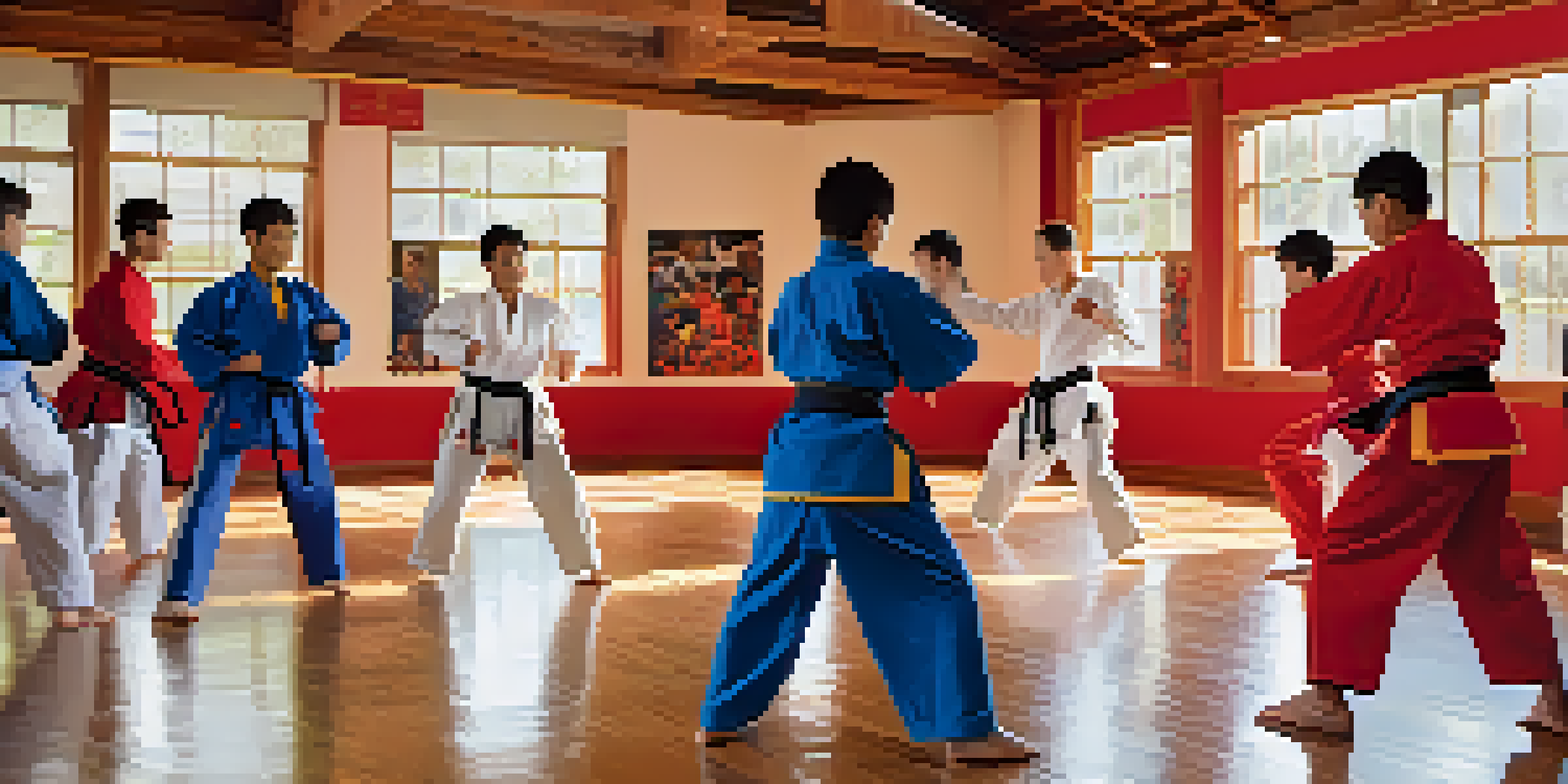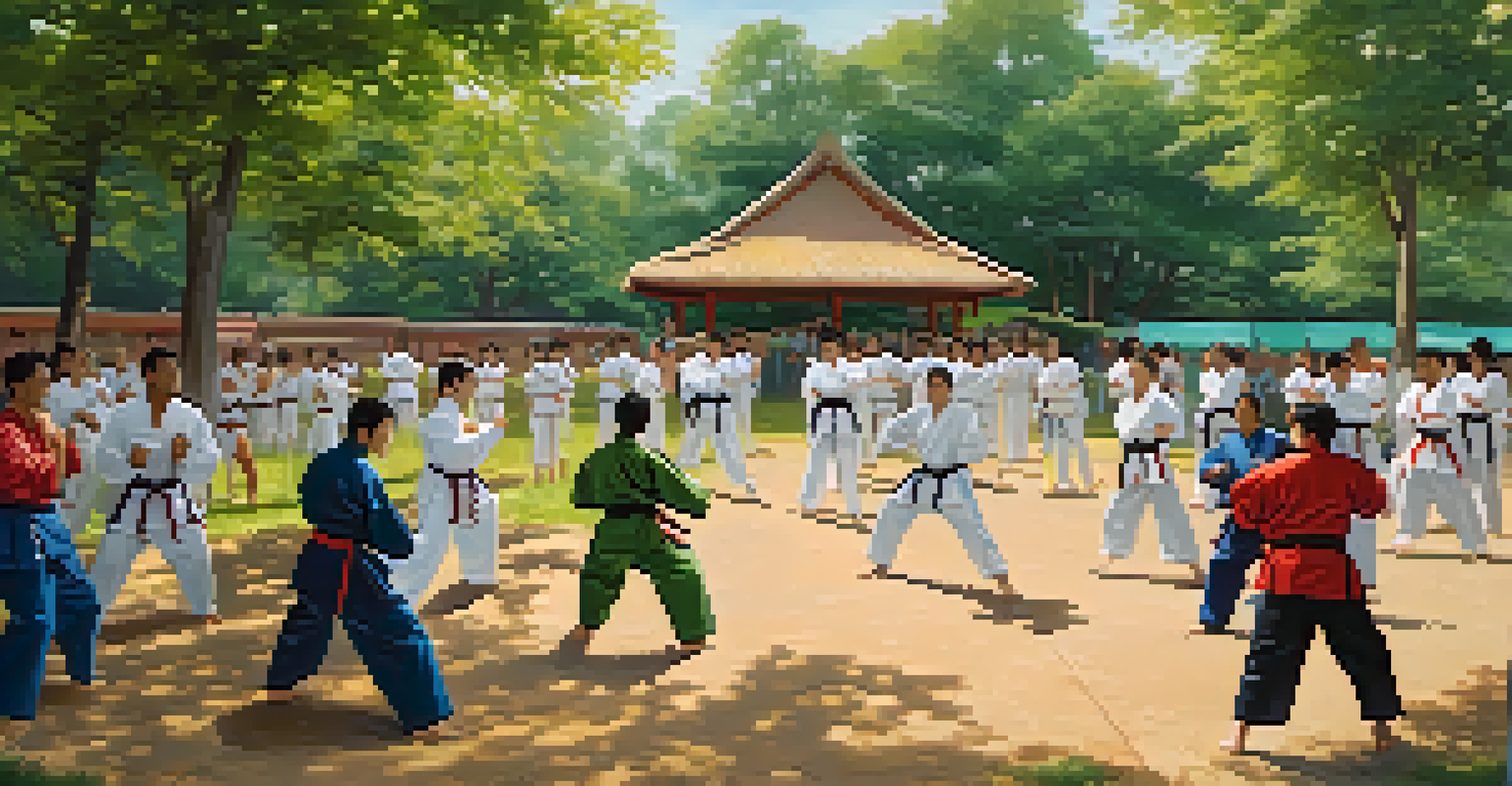Integrating Martial Arts into Public Health Education Programs

Understanding the Connection Between Martial Arts and Health
Martial arts are often viewed as a means of self-defense or competition, but they also hold significant health benefits. Engaging in martial arts promotes physical fitness, flexibility, and overall well-being. Beyond the physical aspects, martial arts also cultivate mental resilience and discipline, which are crucial for a healthy lifestyle.
Martial arts are not just about fighting; they are about building a healthier lifestyle and community.
Public health education aims to improve community health through knowledge and action. By integrating martial arts into these programs, we can address both physical and mental health, creating a holistic approach to wellness. For example, martial arts training can encourage regular physical activity, which is a cornerstone of public health initiatives.
Moreover, the community aspect of martial arts fosters social connections, which are vital for mental health. As individuals bond through shared experiences in martial arts classes, they develop a support system that can help combat feelings of isolation and anxiety.
Benefits of Martial Arts for Physical Health
Physical health is at the forefront of public health, and martial arts offer a dynamic way to improve it. Regular practice enhances cardiovascular fitness, strength, and endurance, making it an excellent alternative to traditional exercise programs. For instance, a study found that participants in martial arts training exhibited improved aerobic capacity compared to those who engaged in standard gym workouts.

Additionally, martial arts can help combat obesity and associated health conditions. By promoting an active lifestyle, these programs can encourage participants to burn calories and build muscle, which is essential for maintaining a healthy weight. Integrating martial arts into public health initiatives could thus directly address rising obesity rates.
Martial Arts Boosts Physical Health
Engaging in martial arts enhances cardiovascular fitness, strength, and endurance, making it a dynamic alternative to traditional exercise.
Lastly, martial arts training can improve coordination and balance, which is particularly beneficial for older adults. By incorporating these practices into public health education, we can help reduce the risk of falls and injuries in this vulnerable population, promoting a healthier aging process.
Mental Health Benefits of Martial Arts Training
The mental health benefits of martial arts are equally compelling. Training involves focus, discipline, and mindfulness, which can help reduce stress and anxiety. This makes martial arts a powerful tool in public health programs aimed at mental wellness, particularly in today's fast-paced world.
The greatest victory is not in never falling, but in rising every time we fall.
Moreover, martial arts often teach techniques for managing conflict and emotions, fostering better mental resilience. For example, practitioners learn to channel aggression and frustration into their training, leading to healthier coping mechanisms. By integrating these lessons into public health education, communities can benefit from enhanced emotional well-being.
Finally, the sense of achievement that comes from mastering martial arts techniques can boost self-esteem and confidence. This uplift can be particularly valuable for individuals struggling with self-image or mental health issues, creating a positive feedback loop that encourages further participation in healthy activities.
Building Community Through Martial Arts Programs
Community engagement is a vital component of public health education, and martial arts naturally foster a sense of belonging. Classes often bring together diverse groups of people, creating an inclusive environment where individuals can support each other. This camaraderie can lead to lasting friendships and a stronger community bond.
Additionally, martial arts programs can serve as platforms for health education, offering workshops and discussions on nutrition, wellness, and lifestyle choices. By utilizing the social aspect of martial arts, public health initiatives can effectively spread valuable information while keeping participants engaged. This dual approach can increase awareness and participation in health-related activities.
Mental Resilience Through Training
Martial arts training fosters focus and discipline, helping individuals manage stress and develop healthier coping mechanisms.
Moreover, community-based martial arts events, such as tournaments or exhibitions, can raise awareness about local health issues. By showcasing martial arts in a public setting, organizers can attract attention to important health topics, making it easier for the community to engage in discussions and seek resources.
Creating Accessible Martial Arts Programs
To successfully integrate martial arts into public health education, accessibility must be a priority. This means ensuring that programs are available to individuals of all ages, backgrounds, and skill levels. Offering classes in community centers, schools, and local parks can help reach a broader audience.
Additionally, cost can be a barrier for many prospective participants. By collaborating with local martial arts schools or instructors, public health programs can offer subsidized classes or scholarships to make training more affordable. This approach not only increases participation but also fosters a sense of community ownership in the program.
Lastly, promoting inclusivity within martial arts classes is essential. Instructors should be trained to work with individuals with different abilities and needs, ensuring that everyone feels welcome and capable. By embracing diversity, martial arts programs can create a supportive environment that benefits the overall health of the community.
Challenges in Integrating Martial Arts into Health Programs
While the benefits of integrating martial arts into public health education are clear, challenges do exist. One significant hurdle is the perception of martial arts solely as a competitive sport rather than a holistic health practice. Overcoming this misconception requires effective messaging and education about the broader benefits of martial arts for health and well-being.
Another challenge lies in securing funding and resources for such programs. Public health initiatives often compete for limited resources, making it crucial to demonstrate the value of martial arts in improving community health outcomes. Gathering data and success stories from pilot programs can help to build a compelling case for funding.
Community Connection and Support
Martial arts programs create an inclusive environment that fosters social connections, which are crucial for improving overall mental health.
Furthermore, ensuring qualified instructors are available to lead programs is essential. Instructors must not only be skilled martial artists but also possess knowledge of public health principles. By providing specialized training for martial arts instructors, we can ensure that they effectively contribute to the health education goals of the community.
Measuring the Impact of Martial Arts on Public Health
To truly understand the effectiveness of integrating martial arts into public health education, measuring impact is essential. This can involve tracking participant engagement, physical health improvements, and mental wellness metrics. By collecting data before and after program implementation, we can obtain a clearer picture of the benefits martial arts bring.
Additionally, conducting surveys and interviews with participants can provide qualitative insights into their experiences and perceived benefits. This feedback is invaluable for refining programs and ensuring they meet the needs of the community. Understanding what works and what doesn’t can help tailor future initiatives.

Lastly, collaboration with public health organizations can aid in evaluating the broader implications of martial arts programs. By sharing findings and best practices, communities can learn from each other, enhancing the overall effectiveness of health education efforts. This collaborative approach not only helps in measuring impact but also fosters a network of support for sustainable health initiatives.